Understanding the Importance of Self-Care in Autism Management
Caring for individuals with autism, whether as a parent, caregiver, or the individual themselves, involves navigating unique challenges that can lead to significant stress and burnout. Incorporating effective self-care practices is essential not only for maintaining mental and physical health but also for fostering resilience, emotional stability, and overall well-being. This article explores comprehensive self-care strategies, including mindfulness, sensory tools, routines, and professional resources, designed to reduce autism-related stress and enhance quality of life.
General Self-Care Practices for Reducing Stress
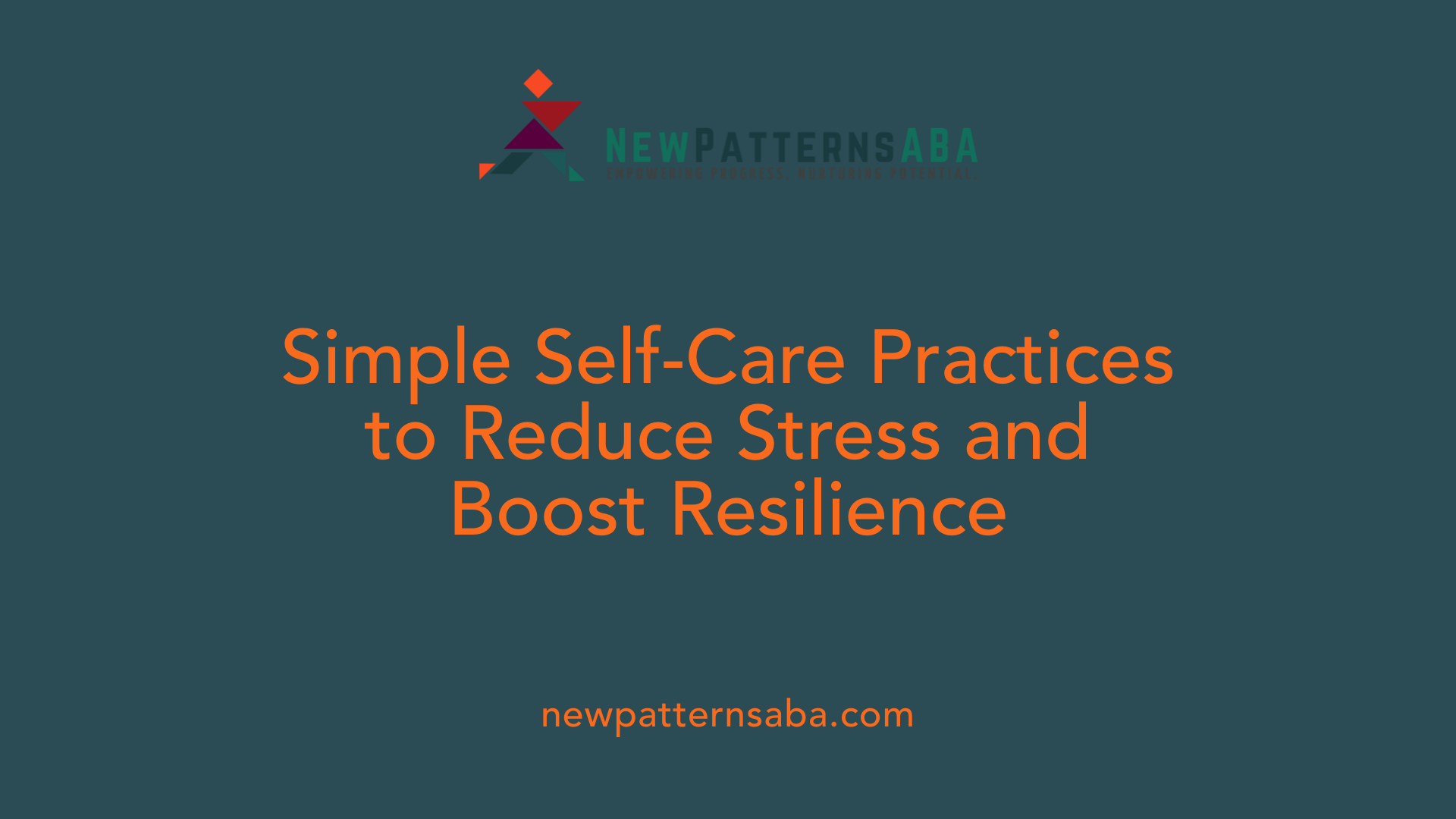
What are some general self-care practices to reduce stress?
Managing stress is essential for parents caring for children with neurodevelopmental challenges, including autism. Incorporating simple yet effective self-care routines can significantly improve emotional resilience and overall well-being.
One fundamental practice is engaging in regular physical activity. Activities such as walking, jogging, gardening, or even cleaning can boost the production of endorphins—the body's natural mood lifters. These exercises not only improve physical health but also create mental clarity and reduce feelings of overwhelm.
Mindfulness techniques form a core part of stress management. Practices such as meditation, deep breathing exercises, and grounding activities help cultivate a sense of calm and presence. These techniques can be practiced informally throughout the day and do not require extensive time commitments.
Maintaining a healthy lifestyle supports stress reduction. Prioritizing sufficient sleep, eating nutritious foods, staying well-hydrated, and engaging in regular exercise contribute to better mental health. Healthy habits reinforce a positive mindset and physical resilience.
Social connections play a vital role, especially during stressful times. Reaching out to friends, family, or support groups offers emotional support and distraction, fostering a sense of community. Participating in social activities or volunteer work can provide purpose and reduce feelings of isolation.
Lastly, doing activities that bring joy and satisfaction can bolster emotional health. Hobbies, listening to music, practicing gratitude journaling, or simply spending time outdoors can elevate mood. These joyful pursuits create positive experiences, strengthening resilience against daily stressors.
| Practice Type | Examples | Benefits |
|---|---|---|
| Physical Activity | Walking, gardening, cleaning | Releases endorphins, boosts mood |
| Mindfulness Techniques | Meditation, deep breathing, grounding exercises | Enhances calmness, presence |
| Healthy Lifestyle Choices | Good sleep, nutrition, hydration | Supports overall health, energy levels |
| Social Connections | Friends, family, support groups | Provides emotional support, reduces loneliness |
| Joyful Activities | Hobbies, music, gratitude journaling | Improves mental wellness, happiness |
By integrating these practices into daily life, parents can better navigate the stresses of caregiving, build resilience, and foster a supportive environment for themselves and their children.
Strategies for Managing Autism-Related Stress
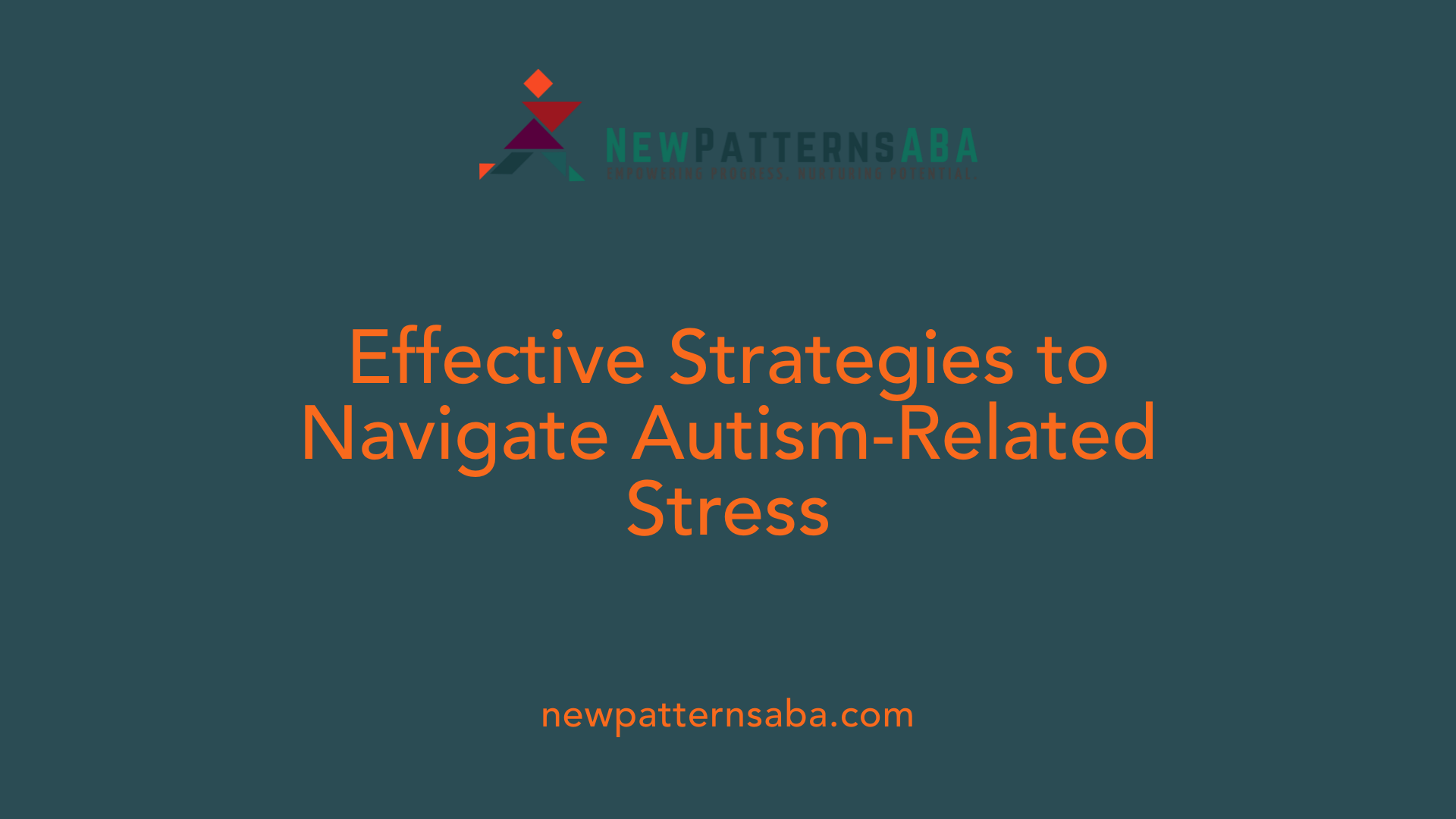
What strategies can help manage stress related to autism?
Managing stress associated with autism involves a combination of practical routines, sensory regulation, mindfulness, and professional support. Establishing predictable daily routines helps reduce uncertainty and anxiety. Visual schedules are especially beneficial, providing clear expectations and a sense of control.
Sensory sensitivities are common among autistic individuals, making sensory regulation tools essential. Noise-canceling headphones, weighted blankets, and calming environments can diminish overstimulation and promote relaxation.
Incorporating mindfulness and relaxation practices into everyday life can significantly improve emotional resilience. Techniques such as deep breathing, muscle relaxation, and engaging in calming activities help regulate emotions and reduce stress.
Seeking professional therapy options like cognitive behavioral therapy (CBT), social skills training, or medication, under the guidance of healthcare providers, can address underlying anxiety and emotional challenges. Tailoring these strategies to an individual’s specific triggers and needs creates a more supportive environment.
Developing personalized coping strategies—such as designated quiet times, engaging in interests, and practicing self-care—is crucial. These practices not only manage immediate stress but also build long-term resilience, improving overall well-being and mental health.
Supporting Autistic Individuals in Stress Management
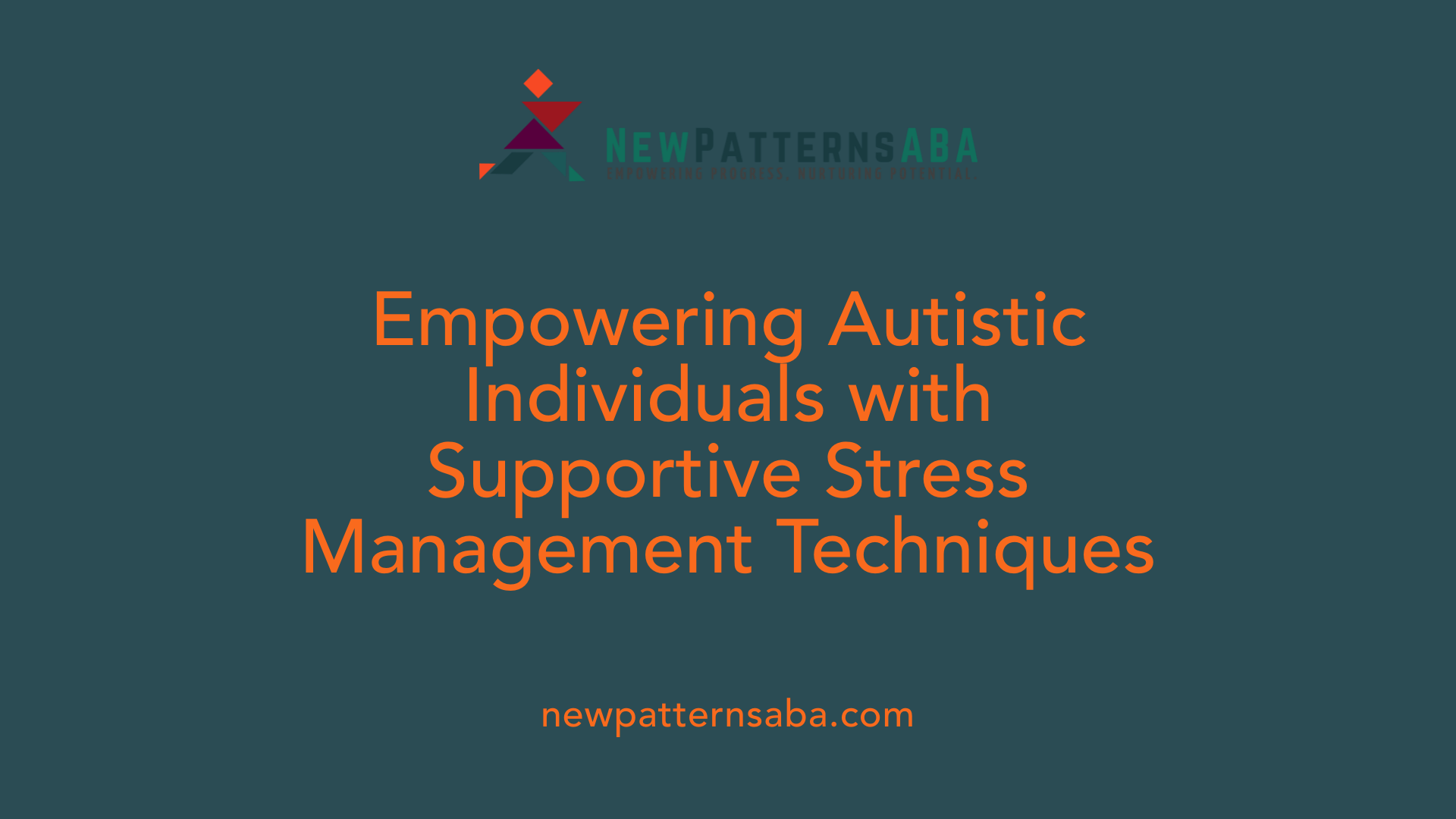
How can caregivers support autistic individuals in managing stress?
Supporting autistic individuals in handling stress involves a combination of structured routines, visual supports, sensory tools, trigger management, and collaboration with professionals.
Creating predictable daily routines can help reduce anxiety by providing a sense of stability. Visual supports like schedules, social stories, and visual cues make expectations clear and prepare individuals for changes or transitions, easing feelings of uncertainty.
Sensory regulation tools are essential in managing sensory sensitivities that often trigger stress. Items such as weighted blankets, noise-canceling headphones, fidget toys, and calming scents can create a sensory-friendly environment, helping individuals feel more grounded.
Identifying personal triggers like loud noises, crowded settings, or sudden changes allows caregivers to develop strategies to avoid or prepare for these situations. Recognizing these triggers early prevents escalation and promotes calmness.
Working closely with mental health and developmental professionals enables tailored interventions. Therapies such as visualized or modified cognitive-behavioral therapy (CBT) can teach coping skills suitable for the individual’s needs.
Incorporating activities like mindfulness, deep breathing exercises, or sensory-friendly relaxation spaces promotes self-regulation and stress reduction. Educating both caregivers and individuals about effective techniques enhances their ability to manage stress independently.
Supporting environmental adjustments, like adjusting lighting or reducing background noise, can lessen sensory overload.
Overall, a proactive and personalized approach—centered on understanding individual needs and collaborating with professionals—can significantly improve stress management, resilience, and quality of life for autistic individuals.
Preventing Burnout in Caregivers and Autistic Adults
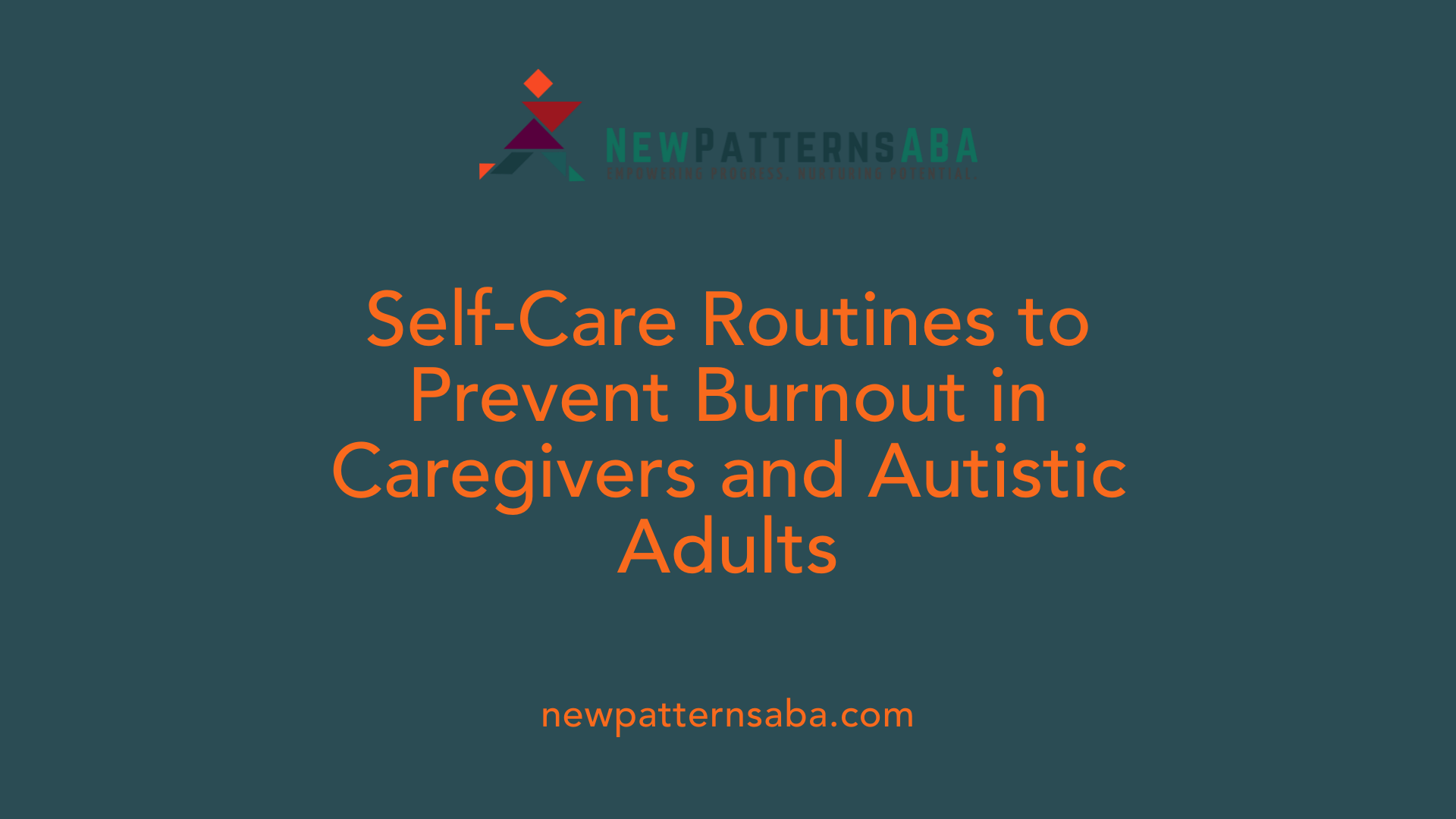
What are effective self-care routines for caregivers and autistic adults?
Implementing consistent self-care routines is essential for maintaining mental and physical health. For parents, this includes prioritizing sleep, balanced nutrition, and regular gentle exercise like walking or yoga. Engaging in mindfulness activities such as meditation, deep breathing, or body scans can help reduce stress and increase emotional resilience.
For autistic adults, routines should incorporate sensory-friendly practices, like using noise-canceling headphones, weighted blankets, or engaging in calming sensory activities. Incorporating regular moments of relaxation and hobbies—such as art, music, or outdoor pursuits—can boost mood and provide a sense of accomplishment.
Both groups benefit from establishing personalized daily routines that provide stability, including sensory breaks, regular meal times, and designated 'me time'. These routines help manage anxiety, reduce overwhelm, and foster a sense of control.
How do support networks help in burnout prevention?
Strong support systems are vital for caregivers and autistic adults. Connecting with family, friends, or support groups like peer mentorship offers emotional understanding, shared experiences, and practical advice. Support groups, such as in-person or online communities dedicated to autism, can provide validation and reduce feelings of loneliness.
Respite care services are also crucial, offering temporary relief to caregivers and allowing them to rest and recharge. This isn’t just about physical rest; it also helps in maintaining emotional well-being.
Why are realistic expectations important?
Setting achievable goals prevents feeling overwhelmed and promotes a sense of accomplishment. Caregivers should recognize what is feasible within their resources and time, and adjust expectations accordingly.
For autistic adults, understanding and accepting their limitations, while focusing on strengths and progress, enhances self-esteem and reduces frustration.
How does seeking professional mental health support aid in preventing burnout?
Therapy options such as Cognitive Behavioral Therapy (CBT), Dialectical Behavior Therapy (DBT), or mindfulness-based therapies provide valuable tools for managing stress, emotions, and behavioral challenges. Professional support can teach coping skills, address feelings of helplessness or hopelessness, and improve emotional regulation.
For caregivers, counseling can also offer strategies for boundary-setting and self-compassion, ensuring they maintain their well-being.
How do boundaries and setting limits enhance resilience?
Establishing clear boundaries is crucial to prevent caregiving responsibilities from becoming overwhelming. This might mean scheduling regular breaks, saying no to additional commitments, or delegating tasks.
Maintaining boundaries helps protect personal time, reduces stress, and models healthy behavior for children and family members. For autistic adults, boundaries around sensory and social interactions support emotional regulation.
| Aspect | Practical Suggestions | Benefits |
|---|---|---|
| Self-care routines | Sleep, nutrition, exercise, mindfulness | Reduces stress, boosts resilience |
| Support networks | Support groups, respite care, community resources | Provides emotional relief |
| Realistic expectations | Goal setting, recognizing limitations | Prevents overload, builds confidence |
| Professional support | Therapy, coaching, mental health services | Skills development, emotional health |
| Boundaries and limits | Scheduled breaks, delegating tasks | Maintains mental health, prevents burnout |
Prioritizing these strategies creates a comprehensive approach to resilience, supporting caregivers and autistic individuals alike to navigate daily challenges with strength and stability.
The Role of Sensory Tools and Routines in Stress Reduction
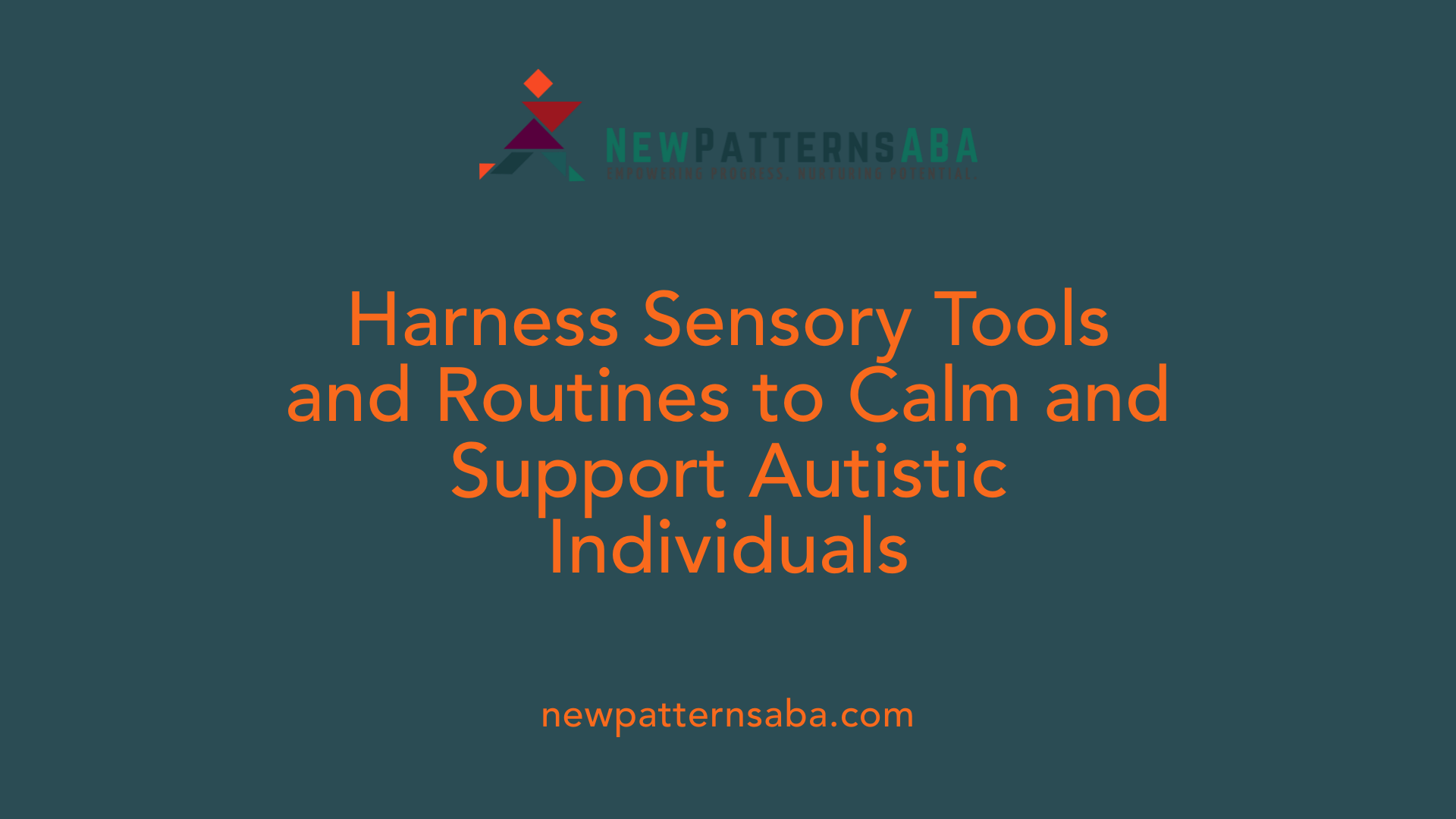
How can sensory tools and routines help alleviate stress in autistic individuals?
Sensory tools and structured routines play a vital role in reducing stress for autistic individuals. These strategies create a predictable and calming environment that can help manage sensory sensitivities and emotional responses. Items like weighted blankets, fidget toys, noise-canceling headphones, and soothing lighting all provide sensory input that can help soothe heightened sensitivities.
Incorporating sensory tools into daily routines offers a sense of familiarity and stability, which is essential for emotional security. For example, scheduled sensory breaks using calming music or tactile activities help individuals regulate their emotions and prevent feelings of being overwhelmed.
Routine activities that include sensory components help maintain a predictable environment, giving a sense of control and easing anxiety about the unknown. These practices can turn stressful moments into manageable ones, easing daily challenges.
Overall, sensory tools combined with consistent routines support emotional regulation, reduce anxiety, and promote a more relaxed daily experience for autistic individuals. They help create a safe space where sensory overload is minimized, enabling better focus, calmness, and resilience.
Professional Resources for Autism-Related Stress Management
What professional resources are available for autism-related stress management?
Families and autistic individuals seeking support for managing stress can explore a range of professional resources tailored to their unique needs.
Mental health professionals, including psychologists, behavioral therapists, and psychiatrists, play a central role in providing individualized care. They often utilize evidence-based interventions such as modified cognitive behavioral therapy (MCBT), psychoeducation, and stress-coping strategies to help manage anxiety and emotional challenges.
Occupational therapists are also valuable; they assist in creating supportive environments through visual schedules, social stories, and sensory tools, aimed at reducing stress triggers and enhancing daily functioning.
Support groups, both online and in-person, serve as a vital resource for sharing experiences and strategies. These groups provide emotional comfort, reduce feelings of isolation, and foster a sense of community among autistic individuals and their families.
For clinicians, organizations like Autism Speaks and professional guidelines such as the Practice Parameter offer evidence-based frameworks for assessment and intervention. These resources guide practitioners in incorporating stress management techniques into holistic care plans.
In cases of severe anxiety or stress-related symptoms, healthcare providers may consider pharmacologic options such as SSRIs. Medications are typically used alongside therapy and under strict medical supervision to ensure safety and effectiveness.
Overall, integrating professional support with personal strategies allows autistic individuals and their caregivers to build resilience, improve mental health, and navigate daily challenges more effectively.
Tips for Parents and Caregivers to Reduce Their Own Stress
How can mindfulness and meditation help parents and caregivers?
Practicing mindfulness and meditation are simple yet powerful ways to manage stress. These techniques help parents stay fully present, becoming aware of their thoughts, sensations, and environment without judgment. Regular practice of exercises like breathing meditation, body scans, and the five senses activity can significantly reduce anxiety and promote emotional stability. Because mindfulness can be integrated into everyday routines—such as during daily chores or quick breaks—it is accessible for busy parents and caregivers.
What support systems are beneficial for parents of children with autism?
Having a strong support network is essential. Connecting with family, friends, or support groups like GET MINDFUL provides emotional backing and shared understanding. Online communities and local groups offer resources, advice, and companionship that help decrease feelings of isolation. Support groups also promote self-compassion by emphasizing kindness, shared human experience, and hope. Reaching out for help ensures caregivers don’t face their challenges alone and can find encouragement.
How does positive reframing help in managing caregiver stress?
Focusing on positive aspects and accomplishments can improve mental health. Recognizing small successes in your child's progress or appreciating good experiences with therapists creates a sense of hope. Reframing challenges as opportunities for growth instead of failures fosters resilience. This optimistic outlook supports emotional well-being and helps caregivers remain motivated and patient during difficult times.
Why are regular breaks and self-care important?
Taking consistent pauses—at least 15 minutes daily—is crucial for recharging. Engaging in activities like light exercise, hobbies, or simply relaxing helps reduce stress. Prioritizing sleep and maintaining healthy eating habits also boosts resilience. These moments of self-care enable caregivers to respond more calmly to challenging behaviors and prevent exhaustion or burnout.
When should parents seek professional help?
Professional support, including therapy and coaching, can be invaluable. Specialized services like cognitive-behavioral therapy (CBT), mindfulness-based interventions, or counseling from clinicians experienced in autism help caregivers develop practical coping skills. Participating in training programs and utilizing telehealth options makes accessing these resources easier. Professional help not only reduces stress but also enhances emotional regulation, making caregiving more sustainable.
| Strategy | Benefits | Practical Tips |
|---|---|---|
| Mindfulness & Meditation | Reduce anxiety, improve focus, foster emotional balance | Practice breathing exercises, body scans, and five senses exercises regularly |
| Support Networks | Emotional support, shared resources, decreased isolation | Join local or online support groups; connect with friends and family |
| Positive Reframing | Maintain hope, increase motivation, reduce helplessness | Celebrate small wins, focus on child's progress, practice gratitude |
| Regular Breaks & Self-Care | Prevent burnout, improve mental and physical health | Take 15-minute breaks, engage in hobbies, prioritize sleep |
| Professional Help | Develop coping skills, emotional regulation, resilience | Seek counseling, attend caregiver training, consider therapy options |
By incorporating these strategies—mindfulness techniques, strong support systems, positive outlooks, regular self-care, and professional assistance—parents and caregivers can better manage their stress. Taking care of oneself not only enhances personal well-being but also improves the quality of care provided to children with autism.
Prioritizing Self-Care for Autism-Related Well-Being
Ultimately, integrating these comprehensive self-care practices—ranging from mindfulness and sensory regulation to professional support and community engagement—can profoundly impact the mental health and resilience of those living with or caring for autistic individuals. Recognizing the importance of self-care not only promotes individual well-being but also enhances the quality of care and support provided to autistic individuals. Prioritizing personal health, establishing supportive routines, and leveraging available resources are essential steps toward mitigating stress and fostering a more balanced, fulfilling life for everyone involved.
References
- Everyday mindfulness for self-care: Tips for parents
- Taking Care of Yourself
- Parent Self-Care for Autism : Managing Stress and Burnout
- Autism and Self-Care
- Self-care for parents of children with autism: Avoiding burnout
- Managing Anxiety and Depression in Individuals with Autism
- Autism Spectrum Disorder and Anxiety/Depression
- Anxiety & Depression
- Managing anxiety and depressive symptoms in adults with ...





